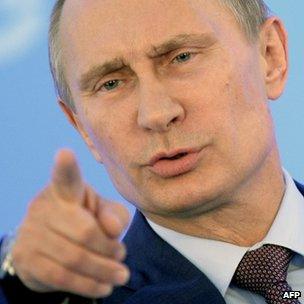Putin's jabs strike home
- Published

Ouch.
Vladimir Putin threw his fellow president a lifeline this week. But while President Obama is still coming up for air, the Russian presses home his advantage by delivering a stern lecture on the dangers of going swimming in dark and dangerous waters.
Mr Putin's opinion piece in the New York Times, external is a savage dissection of Mr Obama's argument for military action against Syria.
It underlines an irony in their often poor relationship.
The bare-chested, horse-riding, tiger-hunting, martial arts expert seems an unlikely peacenik. Indeed he's almost an ideal model for a certain type of hyper-active, interventionist American president, reeking of the Wild West.
The actual US president, on the other hand, agonising and reflective, a one-time campaigner against nuclear weapons and the Iraq conflict, seems a very a reluctant warrior.
In the article, Mr Putin repeats the argument that the chemical attack could be the work of rebels. He says that a strike could help terrorists.
This is familiar. But the heart of his case seems designed to wound Mr Obama, the former law professor.
He writes: "We are not protecting the Syrian government, but international law."
He points out: "Under current international law, force is permitted only in self-defence or by the decision of the Security Council."
He argues that America's actions encourage countries like Iran to seek nuclear weapons.
"If you cannot count on international law, then you must find other ways to ensure your security," he writes.
His conclusion, which may raise eyes at home, goes: "The law is still the law, and we must follow it whether we like it or not."
Hypocritical? Perhaps. But still, ouch.
Mr Putin says his relationship with Mr Obama is marked by "growing trust". This article hardly seems likely to encourage the blooming of that tender fruit. It is more likely to make it wither on the vine.
But he presses home the attack.
Mr Putin is most pointed when he directly addresses America's role in the world - saying it is alarming that US military intervention has become commonplace.
He says that force has proved ineffective and pointless in Afghanistan and Iraq. Millions of people around the world, he continues, see America not as a role model but as "relying solely on brute force, cobbling coalitions together under the slogan 'you're either with us or against us.'"
Then another jab.
Mr Obama has got into trouble in the past at home for being insufficiently deferential towards the notion of American exceptionalism, the doctrine that the US has not just a unique role in the world, but an ordained mission as a beacon of democracy and human rights.
Mr Obama did nod towards this in his speech to the nation, and Mr Putin admonishes him.
"It is extremely dangerous to encourage people to see themselves as exceptional, whatever the motivation."
Ouch.